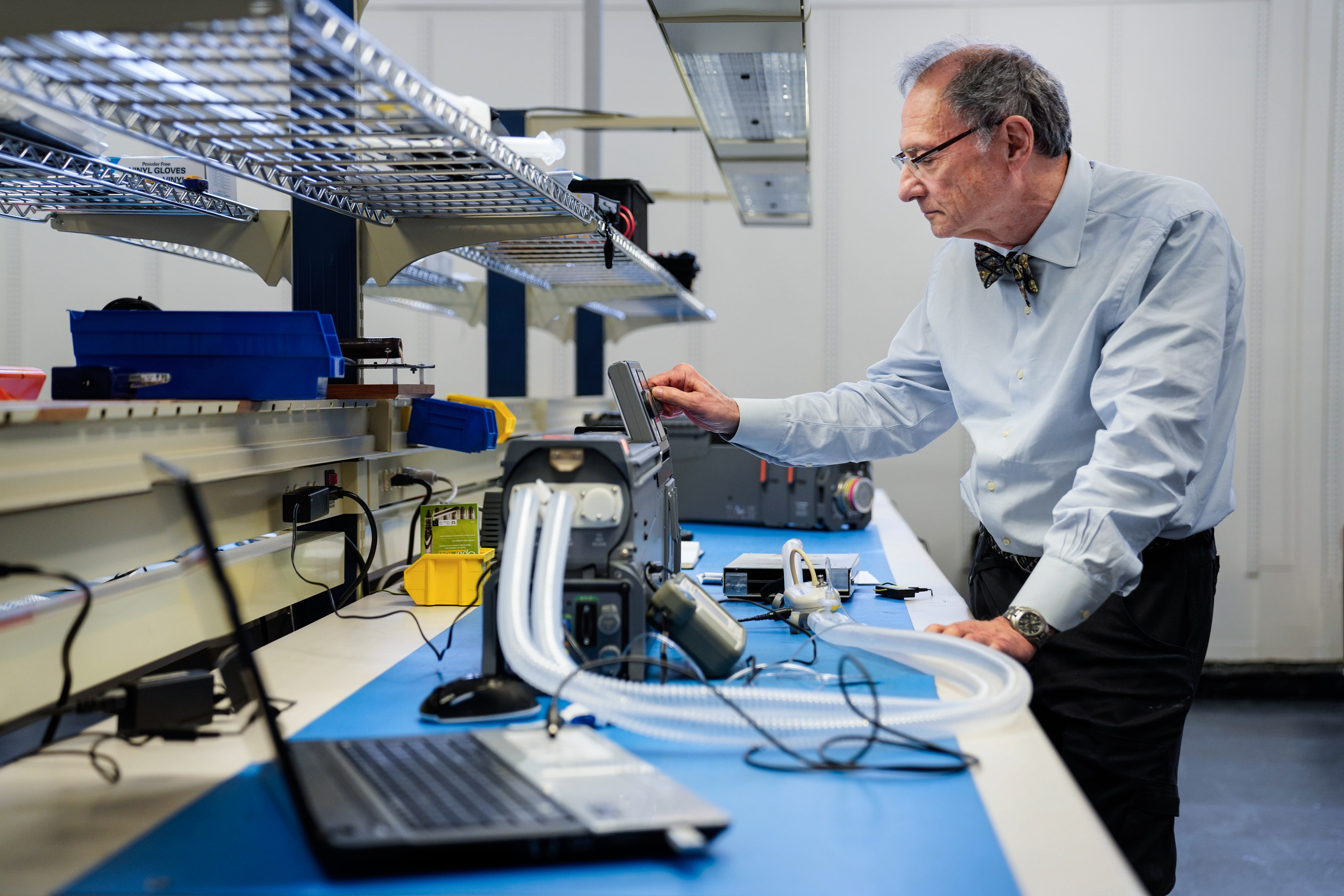
Toronto firm’s portable life support units could supplement ICU beds [UPDATED]
by Will Mazgay, Editor

Thornhill Medical's MOVES SLC system comes equipped with a ventilator that makes its own oxygen, suction, and it provides vital sign monitoring

Joe Fisher, Thornhill Medical’s co-founder and chief scientific officer, inspecting the firm’s MOVES SLC mobile ICU system. PHOTO: Moe Doiron/Thornhill Medical
In the face of the COVID-19 pandemic, worries over medical equipment shortages and the capacity of Canada’s healthcare systems are drawn into sharper focus each day, as the case numbers rise. But the issue keeping most medical professionals up at night is the limited number of intensive care units (ICU) in Canada’s hospitals, which are essential for those who fall gravely ill due to the virus.
While there is a clamour for more ventilators — the mechanical air pumps needed for critically ill COVID-19 patients — one Toronto-based medical equipment manufacturer is promising to replicate the entire ICU apparatus in a portable package.
Thornhill Medical‘s compact and mobile ICU, the MOVES SLC system, comes equipped with a ventilator, but the system also has an oxygen concentrator, suction — for removal of fluids, tissue, and gases — and it provides vital signs monitoring. All of these functions can be powered by a battery, and the unit and battery only weigh about 40 pounds.
Joe Fisher, Thornhill’s co-founder and chief scientific officer, clarified the difference between a ventilator and Thornhill’s ICU system, what he calls a “complete life support system”. “The ventilator is just one component,” he said in an interview with Canadian Manufacturing. “That’s certainly part of the life support, but it [the system] also provides all of the oxygen a patient needs, without any outside equipment. A [traditional] ventilator needs oxygen tanks to provide it with oxygen, and our device just takes it out of the air.”
Fisher continues, “A ventilator requires all sorts of monitoring for the patients. In a critically ill patient, you need rapid feedback into how the patient is doing, so you know how to adjust the intervention. A ventilator [itself] doesn’t do that, it just blows air in and out.”
The executive explains further, “The reality of looking after patients that have multi-organ failure, patients who get an infection, the infection affects many things, not just the lungs. It can affect the brain, the heart, the liver, various other things … This provides the whole life support system that the patient would need.”
Fisher said the device was initially designed to be a mobile life support system for patients who don’t have access to hospitals or medical infrastructure, such as soldiers in the field or victims of natural disasters. However, the current crisis created by the COVID-19 pandemic has provided a new niche for the MOVES SLC to fill.
He said, “Once the intensive care units fill up, then what are you going to do? You’re going to have to look after the patients in the cafeteria or in the hallway or in a tent outside. Well, there you don’t have the intensive care unit. If all you have is a ventilator, then now what?”
Fisher argued Thornhill’s mobile ICU provides a viable alternative to a stationary ICU system.
The company asserts that the unit’s size and weight allow for quick set up and tear down, and that the unit can maintain uninterrupted care anywhere in a hospital, including during transport within a facility or in an ambulance.
The Toronto firm has been busy scaling up to meet increased demand, and it announced on March 31 that it is supplying units to the federal and Ontario governments — 500 initially and now around 1,000 for the feds and 40 for Ontario — to aid healthcare facilities in the fight against the pandemic.
Thornhill says it has partnered with advanced manufacturer Linamar — headquartered in Guelph, Ont. — to enable increased production capacity.
Fisher said of the partnership with Linamar, “It provides us with the immediate surge. If we were to do it ourselves we would have to find space, hire people, train them, get equipment, machinery.” He explained that Linamar has a large excess of industrial capacity and lots of experience, which has made them a valuable partner.
The executive said that dealing with increased demand does have its challenges, including sourcing the components the firm needs amidst increased competition from other companies. However, he said, “We have a very good supply chain. We do get access to many of the supplies that we need.”
Fisher stated enthusiastically, “We don’t see any insurmountable barriers at the moment.”
In terms of what the current situation means for Thornhill and its product, Fisher said, “There is a change in the game. A lot of people think all they need is a ventilator. That’s like thinking when you need a car all you need is a motor. Many people around the world realize that what they need is a whole ICU in a can kind of thing. As people realize that they contact us.”